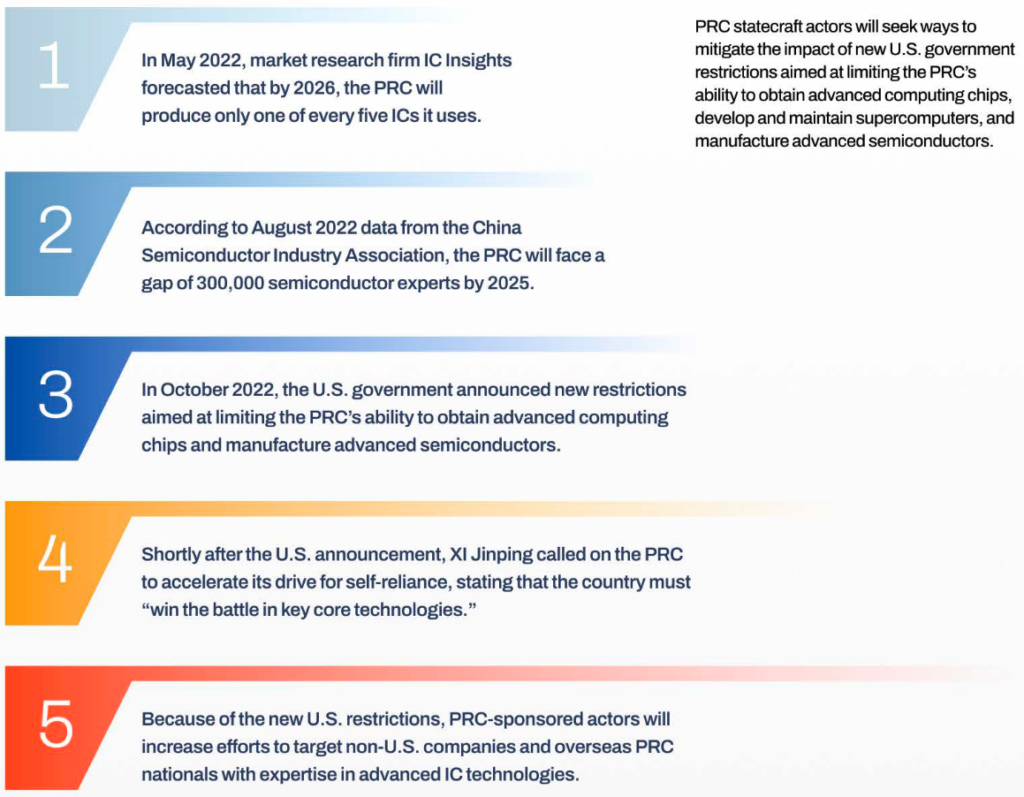Strider Insights
Integrated Circuit Companies Are At Risk
Background
New US government restrictions on advanced integrated circuit (IC) technologies will shape PRC economic statecraft in the new era of global strategic competition. Strider Technologies empowers IC companies to protect intellectual property and talent by providing actionable intelligence that identifies which of their technologies and personnel are at risk.

Mitigating the impact of new restrictions
Statecraft actors from the People's Republic of China (PRC) will seek ways to mitigate the impact of new U.S. government restrictions aimed at limiting the PRC's ability to obtain advanced computing chips, develop and maintain supercomputers, and manufacture advanced semiconductors. The PRC's IC sector is heavily reliant on foreign intellectual property and technology.
- In the days following the US announcement of the new restrictions in October 2022, XI Jinping called on the PRC to accelerate its drive for self-reliance and stated that the country must “win the battle in key core technologies.” The Shenzhen Municipal People’s Government released a new plan to accelerate breakthroughs in the semiconductor industry that included financial incentives and talent programs.
- In May 2022, market research firm IC Insights forecasted that by 2026, the PRC will produce only one of every five ICs that it uses.
Targeting non-U.S. companies
To acquire the tech and talent that fall under the new restrictions, PRC economic statecraft actors are likely to increase efforts to target non-U.S. companies and overseas PRC nationals with expertise in advanced IC technologies. The rules add advanced computing chips, computer commodities that contain advanced chips, and certain semiconductor manufacturing equipment to the U.S. Commerce Control List. They also impose new license requirements with a presumption of denial for items destined to any fabrication facility in the PRC that manufacturers ICs meeting certain specifications.
- The PRC employs a “Talent Superpower Strategy” that incentivizes PRC nationals to go abroad, deepen their expertise, and then work to advance the PRC’s critical technology sectors like advanced ICs. The strategy includes initiatives and programs that seek to exploit these experts’ efforts for the PRC’s gain, whether they return to the PRC or stay overseas.
Increasing efforts to recruit foreign talent
PRC statecraft actors will respond to new restrictions on U.S. persons by increasing their efforts to recruit other foreign talent. The rules restrict U.S. persons from supporting the development, production, or use of controlled IC technologies at certain PRC-based semiconductor fabrication facilities without a license, even if the person is unaware that the facility produces ICs meeting the rules’ criteria.
- The PRC will likely increase recruitment efforts that target leading European, Japanese, South Korean, and Taiwanese experts. PRC firms and government programs will continue to seek US persons to supply, operate, and refurbish equipment at lagging-edge facilities that are not targeted by the new restrictions.
- According to August 2022 data from the China Semiconductor Industry Association, an organization that advises and coordinates government policy, the PRC will face a gap of 300,000 semiconductor experts by 2025.